
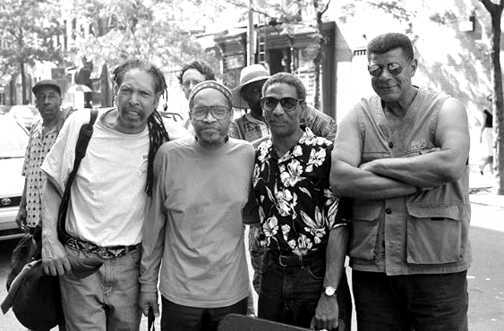
Courtesy of Frank Lowe
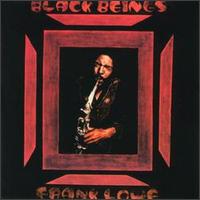
ESP
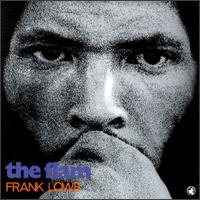
Black Saint
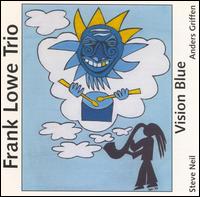
CIMP
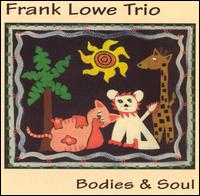
CIMP
A FIRESIDE
CHAT WITH FRANK LOWE
In
a prior life, I did buying for Tower Records. As a buyer, aside from the
weekly visits from record reps pitching product, I would get requests
from customers. One customer in particular thought he was king. A rather
obnoxious long in the toother, this fella was old timing, giving me lectures
on how Kenny G shouldn't be in the jazz section (as if the marquee on
the storefront read something remotely similar to my name) and how he
used to go and see Charlie Parker when he was a kid in Los Angeles. But
when it came to record request, he kept harping on Frank Lowe. Now I knew
of Lowe from his ESP record, Black Beings, which is the poo. But this
old timer was chastising me for not having Bodies & Soul, a CIMP release,
distributed by North Country, which is easy enough to deal with when you
own the record store, but when you are a spoke in the stupidly large Tower
wheel, it becomes almost an impossibility and in the year I was doing
buying, I never got the record into the region. Fast forward to some months
later and on a trip to San Francisco, I came across Amoeba (the Godsend
of record stores) and behold, they had a copy and because that old timer
had bugged the shit out of me, I picked it up. It was quite possibly the
best record I heard that year and to this day, one of my favorites, leading
me to explore and appreciate Lowe's work with Black Saint, Soul Note,
Emanem, and No More. In fact, I have become somewhat of a Lowe aficionado,
but not without good reason. Lowe can play a mean tenor. Through Michael
Marcus, I was able to get Lowe on the Roadshow, and as always, I am honored
to bring it to you, unedited and in his own words.
FRED JUNG: Let's start from the beginning.
FRANK
LOWE: Basically, Fred, it was the sound of the instrument, like you're
listening to a rock and roll record or a pop record. I noticed they always
had the vocals, but I was always interested in the instruments that played
after they finished singing, like when a saxophonist or a drummer took
a solo, it always perked my ears up as a kid. In some kind of way, I was
always drawn to that part of it. It was just an attraction like that.
As a kid growing up, I always listened for who was always cool like The
Coasters and James Brown and stuff like that. I always got off of them
when the saxophonist or the trumpet player or the drummer took a solo.
It was almost like they were talking too. It was almost like it was words
for the instruments like it was words for the vocalists. It spoke to me
like that as a real young kid. I could hear instruments talking just like
I could hear vocalists talking. First it was alto and then the tenor,
when I was around late twelve, thirteen is when I first starting dealing
with it. As far as the tenor was concerned, Gene Ammons always had my
ears locked up. I heard Gene Ammons. My parents dug Count Basie and so
that made a lot of Lester Young being played around my house. So I grew
up with Lester Young in my ears even though there was a lot of Duke Ellington
with Coleman Hawkins and Johnny Hodges and so forth. Some kind of way,
the family I grew up in seemed to gravitate toward Count Basie and Louis
Jordan. I had this Lester Young sound in my ears even though I didn't
know it was Lester Young. So some kind of way, that pulled me towards
Gene Ammons. I remember walking into this place where you could buy sodas
and stuff when I was a really young kid like after school or something
and they had this Gene Ammons record playing on the jukebox. It was some
Soul Stirrin'. It was a Bennie Green thing. Bennie Green had a recording
on Blue Note called Soul Stirrin' with Elvin Jones and Gene Ammons and
Billy Root and Sonny Clark. And I heard Gene Ammons solo on that and I
was flattened. It destroyed me, totally destroyed me and I was no more
good. I was a tenor saxophone freak, probably before then, but that certified
it. That just got me in. I was hearing Coltrane with Miles at the same
time, but it was this Gene Ammons solo that I just had to try the tenor.
FJ: That should come as a cold shower to critics who assume you are coming
from Trane or Albert Ayler.
FRANK
LOWE: Well, Fred, Albert Ayler is one of my favorite people. I think of
music as 360 degrees. I think of it as, like Von Freeman is like one of
my favorite saxophonists on the planet because Von Freeman plays the ultimate.
Von Freeman plays totally great inside and outside. That's, as you might
say, that is what I want to be when I grow up. Von Freeman is eighty years
old and to me, he is the best saxophonist on the planet because Von deals
with both the inside and the outside of the music. He don't run from any
part of it and he does them both well. That's where I come from. You can
call it avant-garde. You can call it hard bop. You can call it soul, but
I dig the whole spectrum, the outside and inside, the Albert Ayler part
of it, the Johnny Griffin part of it, the King Curtis part of it, the
Boots Randolph "Yakety Sax," part of it. I like it all, Fred.
I come from all. I don't dismiss none of that stuff. On this recent LP
I got, I did this tune that some people might call country and western.
It was a Patsy Cline/Willie Nelson (Cline sang and Nelson wrote) called
"Crazy."
FJ: The Nashville theme song.
FRANK
LOWE: You dig? I recorded that. I think of music like that. I love that
tune. It's the one coming out on CIMP that I just finished and it is on
that one. It has Michael Carvin on drums, Bern Nix on guitar, and Dominic
Duval on bass and myself on tenor. It is called Lowe Down and Blue.
FJ: Not to be confused with Lowe and Behold.
FRANK
LOWE: Yeah, yeah.
FJ: And your tenure with Alice Coltrane.
FRANK
LOWE: Well, actually, I was staying in San Francisco and I met Ornette
Coleman, Mr. Ornette Coleman. This was the second time that Ornette had
been through San Francisco, but this was when I decided to let Ornette
know what I was trying to do musically. He became aware of it and he told
me that I should come to New York. After he said those words, I moved
to New York. I was moving to New York, I thought, to study with Ornette,
but Ornette had me come over to his house and I played this music that
he had out. He called it the tenor harmolodic chart. So I played this
piece of music and then he told me that really more than studying, I needed
to work. It was through Ornette that I hooked up with Alice Coltrane.
It was through Mr. Ornette Coleman that I became part of Ms. Alice Coltrane's
band and I am forever grateful for that. I remember the gig that I did
was at the Berkeley Jazz Festival in Berkeley, right outside of San Francisco.
It was like I had just left Berkeley two weeks before and to come back
with Alice Coltrane was like a dream come true. The band, at that time,
consisted of Archie Shepp, Jimmy Garrison, Clifford Jarvis, Alice and
myself. I was in heaven, Fred. As a kid, I was a Coltrane freak and a
Sonny Rollins freak too. I was just into the tenor saxophone, but my ears
had always been open to Wayne Shorter and Coltrane. It was part of my
being. It was just part of my natural being. When I was coming up, most
of the tenor saxophone players, they were trying to get their Coltrane
licks together. I guess it is still like that. He was so dominate in the
music. I was just lucky that my first professional band happened to be
in Ms. Alice Coltrane's band. I always look on it as a blessing. It was
just a gift. I learned so much from Alice. I got a chance to study the
music of John Coltrane really right up close, as close as you probably
could get. It was a blessing to me because after that, I did my first
recording with Ms. Coltrane, an Impulse! thing called World Galaxy and
I was just glad to be a part of it. Later I met Don Cherry and he was
the first one to take me to Europe. I record on an orchestra record he
did called Relativity Suite. Then there was something called Brown Rice.
FJ: Don Cherry was exploring Indian and Arabic music during that period.
FRANK
LOWE: Don doing stuff like what they call world music, I think Don kind
of invented that. He's the father of that. I think Don played a big part
in bring that to the attention of the music public at large. Sometimes
they call it fusion, but let me tell you, Fred, I hear music like this.
What Don was doing was like he was putting like soul, funk, with what
somebody might call avant-garde, with some ethnic music. Don has heard
all these musics and he put them together and they made one music out
of it and that is what I think it is. I think it is one music. If you
are creative enough to put these things together and make them groove,
that's what it is. That's the way I always heard it. I don't see no separation
in these things. I think if you put them together and you make one beautiful
piece of listening material from it, what law says these things have to
have these categories? They are good to classify to sell recordings. You
want to put them in a certain bin, but as far as putting ideas together,
you just have this big pallet that you can draw from and you don't have
to separate these things. There is no thing that says you can't put a
purple beside a green or a white beside an orange. That is what I think.
And at the same time, you don't do it just to put stuff together. These
are great idioms, like hard bop is one of the most difficult musics, bebop
and stuff is the Bible of so called improvisational music. So it is no
joke. When you do that, you study it. You have to do your best with it
and you bring out the best in the music itself. You do it justice.
FJ: Justice was had on your ESP record, Black Beings.
FRANK
LOWE: Oh, yeah, I was lucky. I liked to be on that label because my favorite
people were on that label like Pharoah and Albert Ayler and Sun Ra. I
got in on the tail end of it. That was my idea of being out at that time.
Coltrane had recorded Ascension, so I was starting from Ascension and
going towards nirvana. But I only did one recording like that because
it is not the kind of feeling that you can reproduce all the time. It
was something I wanted to get into and explore, but it is not something
that I would tackle everyday. That color can become monotonous and a bit
redundant, but it is always good to give it that old college try. That's
what I did and that's what it was. It was for that time and for that situation.
FJ: Black Beings is no college try. It is a graduate thesis. But who is
The Wizard (unnamed violin player often incorrectly cited as Leroy Jenkins)?
FRANK
LOWE: It's a guy named Raymund Cheng, a violinist. He is on Lester Bowie's
CD called Rope-A-Dope. That's Raymund Cheng.
FJ: And a young William Parker is featured.
FRANK
LOWE: I was playing with William then. William has always been a really
great bass player, really great, creative, and strong. I was playing with
Don Cherry and he came around and he was sitting in and I dug William's
sound. I was deeply into the Art Ensemble at the time, so you notice the
first CDs that I did under my name, that ESP CD had Joseph Jarman on it.
Fresh (Black Lion) had Lester Bowie and the first one on Soul Note/Black
Saint (The Flam) had Leo Smith on it. It had these AACM cats on it because
I had this deep understanding that the affiliation, I just liked to hook
up those of my peers. I was coming right where they were coming from and
so that was the hook up for me. Guys like that appeared on my first six,
seven, eight records. It's got that Mid-Western thing, cats from Chicago
and St. Louis, Lester Bowie, Joe Bowie, Bobo Shaw, Leo Smith, Olu Dara.
You see where I am coming from? That is how I grew being fortunate to
come through a Coltrane university, I was just exploring what the next
people in line to me were, like Lester and Roscoe Mitchell. They seemed
to be the next people to really add something to the music.
FJ: In the midst of this Art Ensemble fixation, you recorded a duo with
Eugene Chadbourne, Don't Punk Out, which Emanem has reissued.
FRANK
LOWE: Oh, yeah, I am into, some of those colors I got from Derek Bailey
and Anthony Braxton. I have always been into Braxton. Braxton was part,
it is this mathematician thing. I think we did fourteen tunes on there.
I recently did something like that again with a bass player named Bernard
Santacruz, but it was more romantic, a bit more melodic. I believed that
if there was going to be some avant-garde stuff happening, I believed
like you could compartmentalize it. You didn't have to have those long
stretches of tunes. You could make them like a minute and a half and have
them brief and have them concise and tell a story real good. Get in and
get out. I was trying to show an example of that, that the music didn't
have to be long and drawn out. You could make these little statements,
these miniature statements and they could be very strong and creative
and you could capsulate everything you wanted to say in two minutes.
FJ: The longest tune is barely over five minutes.
FRANK
LOWE: Yeah, well, it is like what I did with Bernard Santacruz. It is
basically the same type of situation only the compositions I think are
a bit more impressionistic. It is just some ideas. The music, you tell
a little story. Like you are writing a letter, you have an introduction,
a main body, and you have the salutation, you have the closing and that
is it. In the main body, you try to say everything you have to say right
in there. That is how I approach a solo.
FJ: You featured Grachan Moncur III on Decision in Paradise (Soul Note).
FRANK
LOWE: That's my dream band. Yeah, I always dug Grachan from those records
with Jackie McLean, Destination Out! and One Step Beyond. I always dug
Grachan from those. I just dug his sound. Oh, man. Grachan is a true minimalist.
He's like the king of the Wayne Shorter concept, the less is more concept.
Check it out.
FJ: And the triumph, Bodies & Soul.
FRANK
LOWE: I had fun doing that. I had fun. I got a chance to play some compositions
of my favorite people and also participate with Mr. Moffett. It was maybe
the second or third time we had been in the studio. All the people in
that era, Charles Moffett, Ed Blackwell, Billy Higgins, they are like,
what can you say? What can you say about them cats?
FJ: The take on "Impressions" is something else.
FRANK
LOWE: Oh, yeah, Fred. We kicked it in. We kicked it in.
FJ: You returned to the trio form with Vision Blue (CIMP).
FRANK
LOWE: Oh, yeah, Steve Neil. Sometimes I just try to get, it is like this,
Fred, I study the music and when I do a recording, it is like a report
card. I just like to show what I studied over a six or eight month period.
I do it and I give it to the people to grade. This is what I have been
doing in the past year. I hope you like it and here it is. That is what
the recordings are for me. It is what I have been doing since the last
time you heard from me and this is what I have to say and feel with me.
FJ: Your recent sessions have been for No More.
FRANK
LOWE: With Billy and the other one with another one of my favorite bands.
We had some good fun doing that with Jack, Ralph, and Steve.
FJ: And the future?
FRANK
LOWE: This one is a quartet that is coming out called Lowe Down and Blue.
It has Carvin on drums, Bern Nix on guitar, and Dominic Duval on bass
and myself on tenor. It should be out any day now. I am working on some
things now, Billy Bang and myself.
Fred Jung is the Editor-In-Chief and is driving the Raider Nation to San
Diego. Comments? Email Him